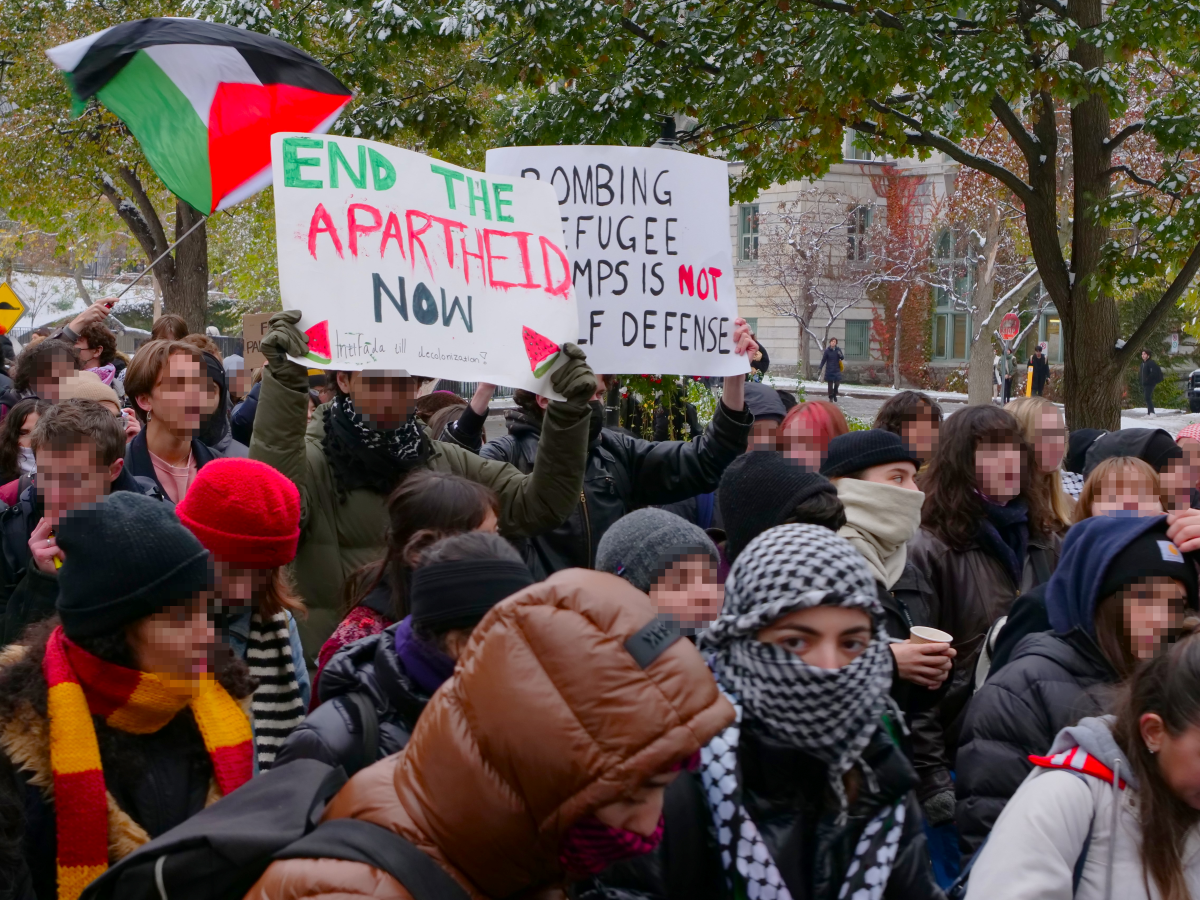Montreal students demand an end to unfair media coverage.
As the Israel-Hamas war continues to create polarized tensions, students in Montreal accuse the media of biased coverage and creating mistrust.
At a pro-Palestian march on Nov. 9, protesters directly targeted Radio Canada, TVA and CTV, all of whom were present. The protesters yelled: “Every time the media lies, neighborhoods in Gaza die. Shame on you!”
At the demonstration, a young woman half-masked by a red keffiyeh was surrounded by individuals holding “Jews say ceasefire now” and “Ending the genocide of the Palestinian people” signs, when she took the megaphone to denounce TVA Nouvelles.
“They [TVA] said there were only Arabo-muslims yesterday,” she added, referring to the incident at Concordia the previous day. “Can I hear all the other nationalities and religions here?” The crowd replied: “Yes!”
The march occurred a day after the incident at Concordia’s Hall Building on Nov. 8. The aftermath of the incident caused tensions to rise on campus, as various media outlets attempted to accurately recount the beginning of the conflict through interviews.
The Concordia pro-Israel club StartUp Nation called out CBC’s latest article, promising to “release the truth about yesterday’s horrific events on Concordia campus.”
According to a statement given to CBC, “Pro-Israel people came barging in and began screaming anti-Palestinian slogans and slurs at them.” This statement was denied by StartUp Nation. The group has since then published videos of the escalation on Instagram that contradict the statement given to the CBC.
During the protest, The Concordian spoke to various students from neighboring universities, to get their thoughts on the media coverage of events that ocurred over the past few days.
Karim, a UQAM student, deplored the polarizing angle of Canadian media stories. “The media are trying to show some sort of consent that Israel is right to do what they’re doing,” Karim said. “But people don’t believe them anymore. The information intensely flows through social media.”
Luz Montero, a UQAM student, held a painted portrait of Netanyahu with the word “infanticide” sprayed around his head. Montero said she stopped following mainstream media, instead getting information through alternative media. “The last thing I saw from CNN, I was like, ‘Oh my God, come on… Stop!,’” Montero said. “We are not ignorant, we know what’s happening there.”
David Derland-Beaupré, a Concordia student and member of La Riposte Socialiste, recounted challenging a Radio-Canada reporter about their support for either the pro- or anti-Israeli. “Where you don’t take sides, you take the side of those who oppress,” he told them. “So you have to expect that people don’t trust you anymore.”
Tara, a member of the Independent Jewish Voices at McGill, weighed in on the Nov. 8 incident at Concordia’s Hall building. “It’s really a horrific show of what divisive rhetoric can do, especially from university administrations that have a duty of care to protect all of their students rather than just a certain cohort,” Tara expressed.
While Thursday’s protest was unfolding, the Canadian Jewish Advocacy (CJA) federation held a press conference to express safety concerns following two Jewish school gunshots that occurred overnight.
Yair Szlak, CEO of CJA, said that the pro-Palestinian protest was “salt in the wounds” of the Jewish community, as the demonstration was scheduled on the anniversary of Kristallnacht, a Nazi assault against the Jews in 1938. “The poster that [the pro-Palestinian protesters] use shows the breaking of glass,” Szlak said. “‘Kristallnacht’ means the night of broken glass,” which represents antisemitism for the Jewish community.
During a press conference on Nov. 8, Prime Minister Justin Trudeau expressed that Canada is indeed facing a rise in antisemitism, which instills fear in Canadians across the country.
“We need to make sure that Canadians are doing what we do best, which is listening to our neighbors, understanding and acknowledging our neighbors’ pain, even though it may be diametrically opposed in its cause, to the same pain that we are feeling.”
